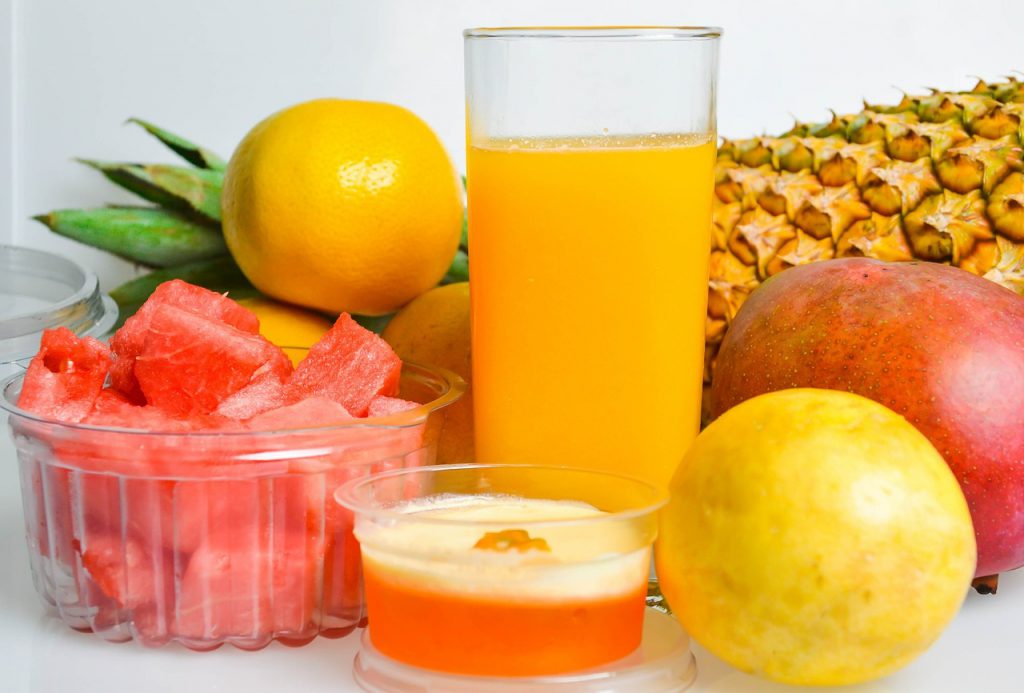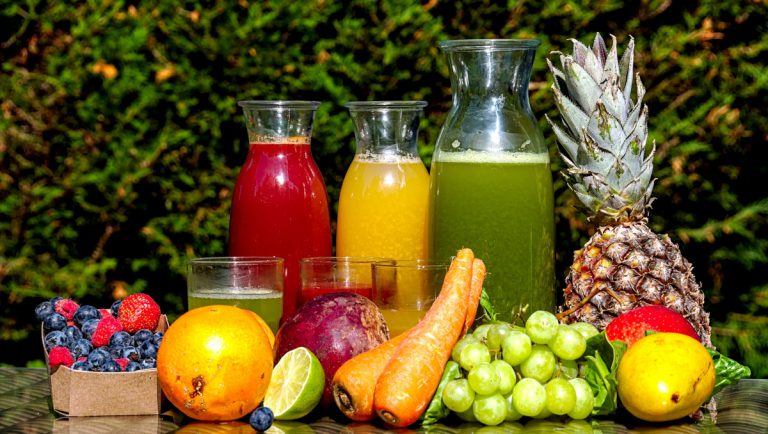Pineapple juice compared to orange juice both offer unique flavors and nutritional profiles. Whether you’re sipping it on a warm summer day or seeking a vitamin-packed boost in the morning, these fruit juices offer a burst of flavor and nutritional benefits.
I’ll delve into the world of pineapple juice vs orange juice, comparing their calorie content, macronutrients, vitamins, minerals, and distinct flavors.
Calories per 100ml in Pineapple juice and Orange juice
When it comes to counting calories, being aware of the content in your favorite beverages is essential. Let’s start by comparing the calorie content of pineapple juice and orange juice. In a 100ml serving of pineapple juice, you’ll find approximately 50-60 calories, while the same serving size of orange juice contains around 40-50 calories. So, if you’re watching your calorie intake, opting for orange juice might give you a slight advantage.
Macronutrients and Calories
Apart from calories, it’s important to consider the macronutrient content of these juices. Both pineapple juice and orange juice are low in fat and protein, and they do provide some valuable nutrients. In terms of carbohydrates, orange juice contains around 9 grams per 100ml, while pineapple juice typically has slightly higher carbohydrate content at approximately 13 grams per 100ml. However, these natural sugars are accompanied by dietary fiber, which plays a crucial role in digestion and overall health.

Orange Juice and Pineapple Juice Nutrition Difference
Now, let’s take a closer look at the nutritional differences between orange juice and pineapple juice. In the table below, you’ll find a detailed breakdown per 100ml of each juice’s nutritional profile:
| Nutrient | Orange Juice (per 100ml) | Pineapple Juice (per 100ml) |
|---|---|---|
| Calories (kcal) | 45 | 53 |
| Vitamin C (mg) | 50 | 25 |
| Sodium (mg) | 0 | 1 |
| Calcium (mg) | 1 | 5 |
| Iron (mg) | 0 | 0.3 |
| Magnesium (mg) | 11 | 12 |
| Phosphorus (mg) | 12 | 10 |
Data sourced from U.S. Department of Agriculture (https://fdc.nal.usda.gov/)
Orange juice contains a higher amount of vitamin C compared to pineapple juice. Vitamin C is an important antioxidant that supports our immune system and overall well-being. However, pineapple juice isn’t far behind; it still provides a decent dose of this vital vitamin. When it comes to sodium, orange juice has none, while pineapple juice contains a minuscule amount. Both juices offer small amounts of minerals like calcium, iron, magnesium, and phosphorus, contributing to your daily intake.

Pineapple Juice vs. Orange Juice: Vitamins and Minerals Comparison
Let’s further explore the vitamins and minerals found in pineapple juice and orange juice, and their benefits and differences.
Orange juice is widely consumed for its high vitamin C content, which helps boost the immune system, aids in collagen production, and enhances iron absorption. Additionally, it contains traces of vitamins A, B6, and folate, which support vision, metabolism, and cell growth. On the other hand, pineapple juice contains notable amounts of vitamins A and B6, along with smaller amounts of vitamins E and K. Vitamin A contributes to healthy vision, while B vitamins play a crucial role in energy production and brain function.
When it comes to minerals, orange juice offers a touch of calcium, which supports bone health, and small amounts of potassium and magnesium, which are important for heart health and muscle function. Pineapple juice, while lower in calcium, compensates with higher levels of manganese, a mineral involved in enzyme activation and bone development. It also provides potassium and magnesium in moderate quantities.
Fat Comparison of Pineapple Juice and Orange Juice
Both pineapple juice and orange juice are virtually fat-free. They are considered healthy beverage choices for individuals who are conscious about their fat intake. So, feel free to enjoy a glass of either juice guilt-free!
Antioxidants and Phytonutrients
Apart from vitamins and minerals, both orange and pineapple juices are packed with antioxidants and phytonutrients, which contribute to their vibrant flavors and potential health benefits. Oranges are well-known for their rich flavonoid content, which possesses anti-inflammatory and antioxidant properties. Pineapples, on the other hand, contain bromelain, an enzyme that aids digestion and offers anti-inflammatory benefits.
Final Thoughts on Pineapple Juice Compared to Orange Juice
Pineapple juice and orange juice each bring their own unique flavors and nutritional profiles to the table. While orange juice shines with its high vitamin C content, pineapple juice offers its distinct taste and bromelain enzyme. Ultimately, the choice between these two refreshing juices comes down to personal preference and the specific nutrients you seek. Whichever juice you choose, remember to consume it in moderation as part of a balanced diet.
So, the next time you’re contemplating a fruity beverage, consider the delightful qualities of pineapple juice and orange juice. Whether you’re savoring the tangy sweetness of oranges or indulging in the tropical zest of pineapples, both juices have something unique to offer. Cheers to the delicious world of fruit juices!
Quick FAQs on Pineapple Juice compared to Orange Juice
There is no definitive answer to which juice is better as it depends on personal preferences and nutritional needs. Orange juice is higher in vitamin C, while pineapple juice offers a distinct tropical flavor and bromelain enzyme with potential health benefits.
Pineapple typically contains about 48% of the typical person’s recommended daily intake of vitamin C per 100g serving.
Orange juice is generally more acidic than pineapple juice. Orange juice typically has a pH range of 3.3 to 4.2, while pineapple juice falls within a pH range of 3.5 to 5.0.
Orange juice generally has less sugar than pineapple juice. On average, orange juice contains around 8-9 grams of sugar per 100ml, while pineapple juice typically has around 10-12 grams of sugar per 100ml.
Orange and pineapple juice can be part of a healthy diet when consumed in moderation. They both offer nutritional benefits, such as vitamins, minerals, and antioxidants. Freshly squeezed or 100% juice options without added sugars is recommended for maximum health benefits. Additionally, it’s always a good idea to consult with a healthcare professional or registered dietitian for personalized dietary advice.
Title Photo courtesy of Zlatko Đurić


0 Comments